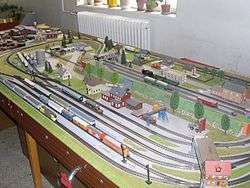TT scale
| TT Scale | |
|---|---|
 TT scale model railroad | |
| Scale | 1⁄10 inch to 1 foot |
| Scale ratio | 1:120 |
| Standard(s) | NEM, NMRA |
| Model gauge | 12 mm (0.472 in) |
| Prototype gauge | Standard gauge |
TT scale is a niche model railroading scale, whose name stands for table top.
Its 1:120 (1:130 in Russia and ex-USSR, 1:101.6 in UK) scale (from a common engineering scale where one inch equals ten feet) and 12 mm (0.472 in) gauge sizes it almost halfway between HO scale (1:87) and N scale (1:160). Its original purpose, like the name suggests, was to make a train small enough to be able to assemble and operate it on a tabletop.
TT retains a comparatively small niche in the United States and in the United Kingdom, but its growing popularity in the former East Germany makes it the second most popular scale in Eastern Europe and Russia. Adherents to TT maintain it is the smallest practical scale, especially for those who like to build models from scratch.
In wargaming the TT scale roughly equals the 15 mm scale where the height of "standard" 180 cm (70.87 in) soldier height is 15 mm (0.59 in).
History
TT scale was invented in the United States by Hal Joyce, a former automotive designer. He founded a company, H. P. Products, in 1945, and the first advertisement appeared in 1946. The product line included locomotive kits, passenger and freight car kits, track and detail parts.
By the early 1950s it had a following, offering less detail than HO—considered by some to be an advantage at the time—and a lower price than most other scales. Numerous other companies began offering TT scale trains, track, and accessories as well, and TT scale became popular in Europe in addition to the United States. In the immediate period afterward, several other manufacturers also began production of TT items, notably the Kemtron Corporation (founded by Levon Kemalyan, which manufactured metal castings in several scales. Rokal and Zeuke (which became Berliner TT-Bahnen and ultimately Tillig) also began production.
By the early 1960s, TT had been eclipsed in popularity by N scale, which is smaller. H. P. Products discontinued manufacturing their TT line in 1968, and the related tooling and kits have been passed through several hands. Rokal ended production in 1969.
British TT
| British TT, TT3 or 3 mm scale | |
|---|---|
| Scale | 3mm |
| Scale ratio | 1:101.6 |
| Model gauge | 12 mm (0.472 in) 13.5 mm (0.531 in) 14.2 mm (0.559 in)[1] |
| Prototype gauge | Standard gauge |
British TT is 3 mm scale; that is, 1:101.6. The "Three Millimetre Society"[2] is a British-based society which caters for railway modellers of 3 mm scale. This society was formed in 1965,[3] eight years after Tri-ang Railways, a British railway manufacturer introduced model locomotives and rolling stock, in what was then a new model railway scale in Britain, known as 'TT' or 'TT3' in 1960. The aims of the society are to encourage modellers working in this scale and it produces a quarterly magazine and assists with the production of locomotive and rolling stock kits, components and the supply of secondhand items and spares.
Manufacturers
Currently Tillig is the largest company to make TT scale rolling stock. Most TT scale track today is also made by Tillig, which offers both standard model railroad track and an integrated roadbed track using Kato's Unijoiner system. But the growing interest for the scale has led to more manufacturers during the last few years, and the scale has also attracted some of the big actors within other scales. Roco launched their first TT products in 1998, and has a small but growing line. Smaller producers like Kuehn and Beckmann have widened their product lines in recent years, just like Hungarian Deak Modelsport and Czech Rubikon and KPA. Fleischmann and created a single TT product (a turntable), but have not continued to develop any new products- since they now share a parent company with Roco, this turntable is now sold under the Roco brand . Russian Peresvet is another manufacturer who produces TT scale models, mostly Russian prototypes. German low-price manufacturer PIKO has also started with a TT line, focusing mainly on German stock. Arnold launched their first new TT models since being bought by Hornby in 2014.
There is a larger variety in the accessories market, where some companies have a long-time involvement with the scale and others recently started to support it as well. Prototypes are almost only German (with a focus on the former East Germany) and some Eastern European models. Auhagen is a major supplier of models of Continental buildings. Triang produced a Continental/French range but it was only made for a very short while.
One current manufacturer of British TT is 3 mm Scale Model Railways[4] who supply updated GEM and BEC TT kits as well as a large range of Brass Etch and Resin body kits.
American manufacturers include Possum Valley Models (kits), Sleepy Hollow/Gold Coast (ready to run and kits, Costal Engineering (kits) DnS TT Track and others.[5]
Various cheap battery toy train sets, typically with plastic track, can also be found in TT gauge.
Related scales
Variations include TTn3, where TT scale is run on N gauge (9 mm/0.354 in) track for narrow gauge operation. In New Zealand, this is known as NZ120[6] and is growing in popularity as a means of modelling the nation's 3 ft 6 in (1,067 mm) gauge railway network. TT9 is modelling using British TT scale on 9 mm track to model 3 ft (914 mm) gauge lines.
See also
| Wikimedia Commons has media related to TT scale. |
References
- ↑ Three Millimetre Society
- ↑ Three Millimetre Society
- ↑ 3 mm Society: History
- ↑ 3smr.co.uk
- ↑ See ttscale.com for additional information.
- ↑ nz120.org